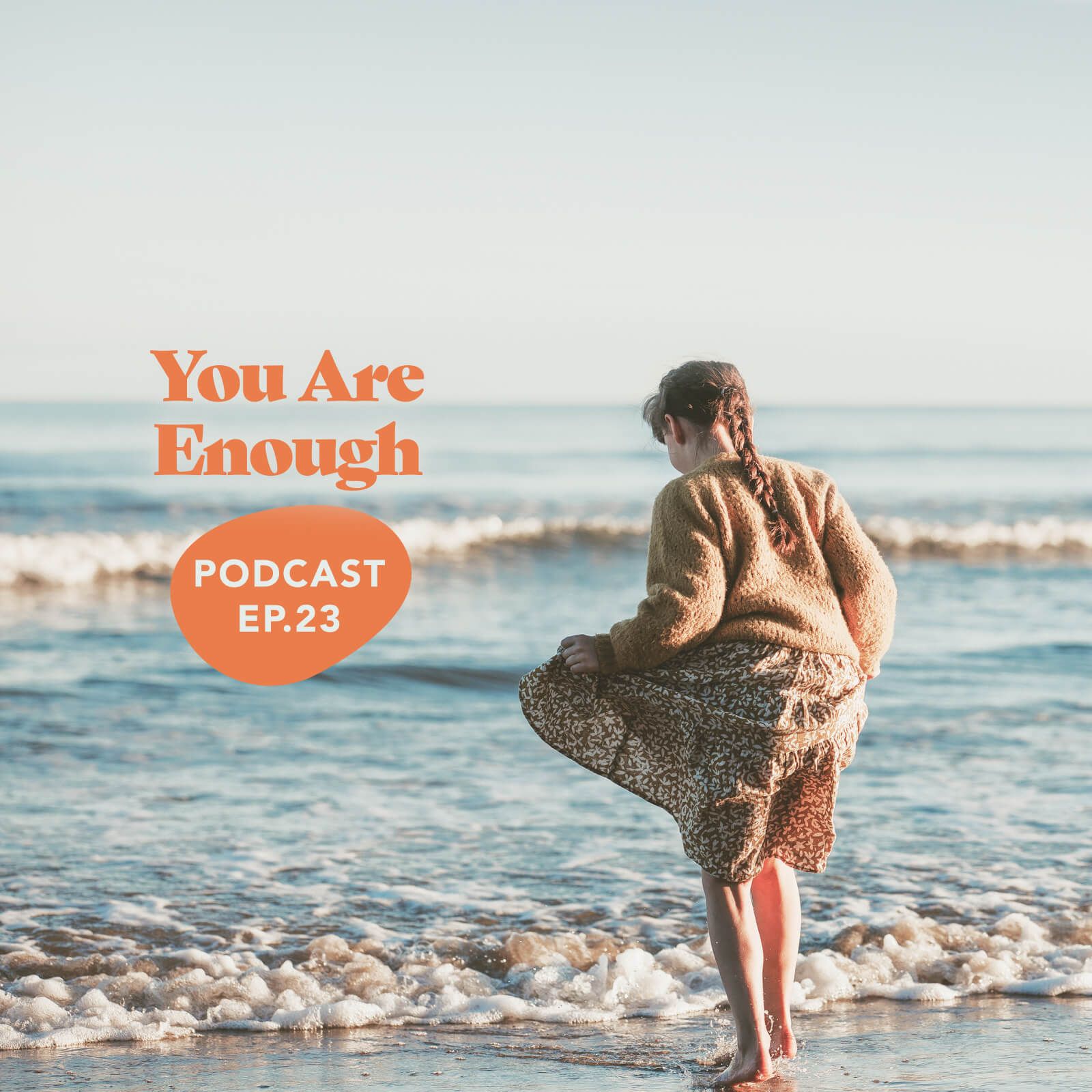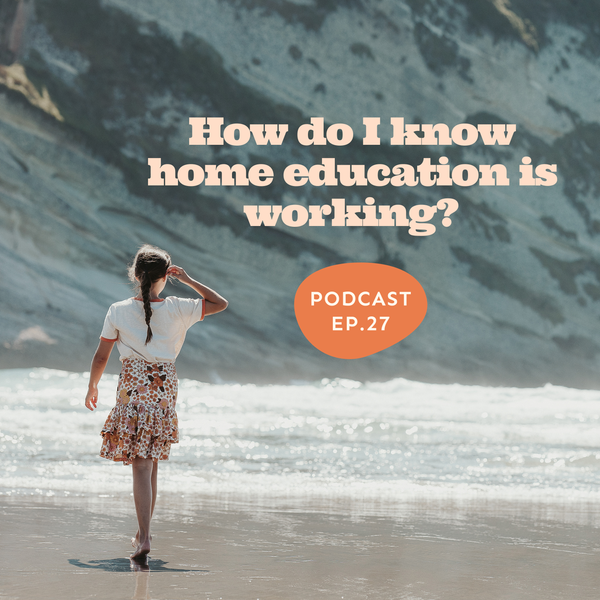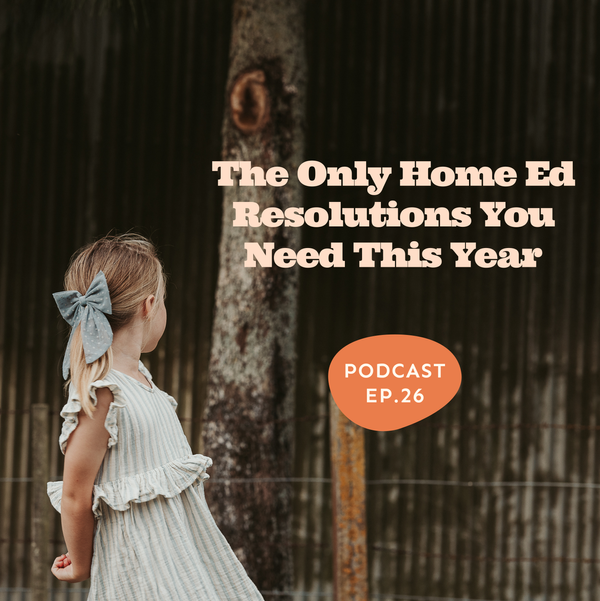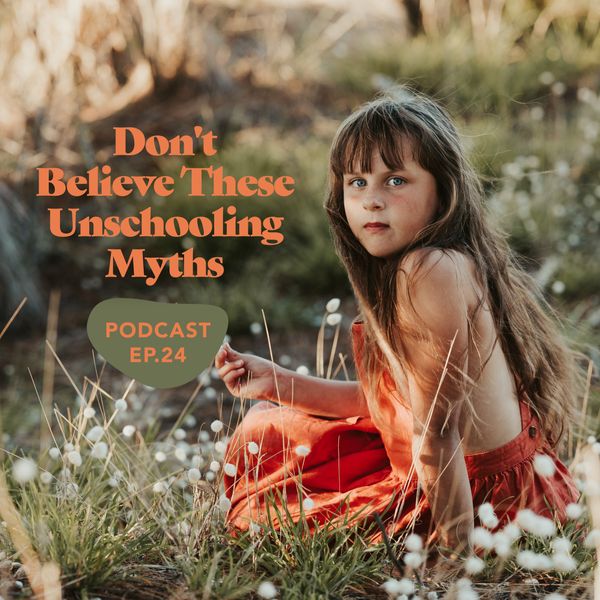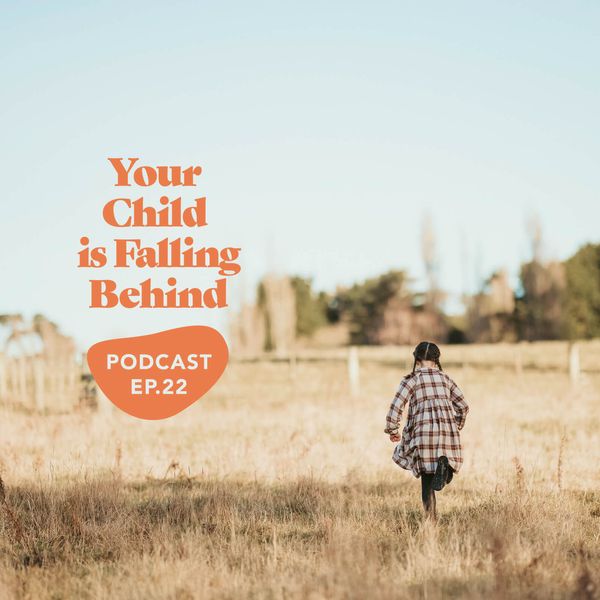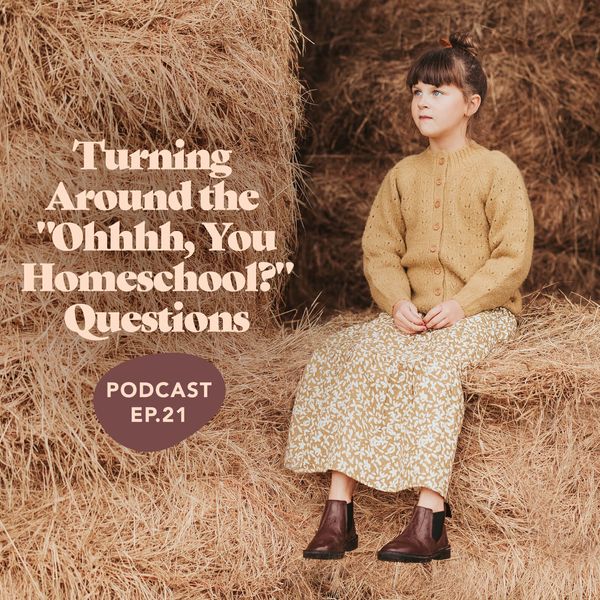In this episode, I’m sharing six ways you can overcome feelings of not being ‘enough’ as a home educating parent. Not smart enough, organised enough, social enough, structured enough, confident enough, qualified enough…
I wrote a post recently that started scratching at the surface of this, and a chorus of relief and connection followed it. But there is SO much more encouragement I can bring here, so today...we’re digging deep 🙌🏼
These private episodes go even deeper, backed by research, the science of how children learn and grow, and more than a decade of lived home educating experience. Each one is designed to help you rethink, reframe, and recalibrate the way you're walking this path, giving you the confidence to live the version of life you want. The Collection is 23 episodes strong and counting, with over 10 hours of listening available right now.
As a subscriber, you'll also get immediate access to my self-paced course, expert-led masterclasses recordings, five downloadable guides, our school exemption documents, and more 💛
Show Notes
Naomi Fisher on Twitter: https://twitter.com/naomicfisher
Complete Transcript
INTRO
Helloooo and welcome to the Life Without School podcast, here to help you and your children live the life you want to, not just the one you’re told you should.
I’m Issy, a writer and home educating dad from New Zealand.
You can find my work at starkravingdadblog.com – all of my posts, podcast episodes, coaching and courses created to encourage, support and reassure anyone walking this road less travelled.
Thank you so much for tuning in to listen today. Alright, let’s get into this week’s episode.
/INTRO
Hello hello, it is SO good to be back with a new episode. I just want to say thank you to everyone who has reached out and given me encouragement to keep the podcast going. I can promise you it’s not going anywhere – this vehicle of sharing is such a powerful way to dig deeper into the feelings behind my posts, so I’m the podcast game for the long haul. But, yes, life has been very full throughout winter over here, so I’m sorry to have left you hanging for a couple of months without a fresh episode to get into.
But we’re back.
And the spark for what I want to talk about today came out of a post I wrote recently on being enough. Because it’s a term I hear a lot in home education – it’s a term I’ve used, or at least felt – myself at times.
Am I smart enough or organised enough to do this home education thing justice.
Am I relaxed enough, or social enough.
Am I qualified enough…
This…feeling…that we may not have enough of the right characteristics and qualities to make the most of home education.
The post started scratching at the surface of those feelings, and a lot of interaction bubbled up around it. As always with my posts, they’re born from within me – from within my own insecurities, and struggles, and fears, and hopes…and this stuff around being enough seemed to strike a chord with a lot of you.
So today, I want to dig right down into this. Because I think there are a bunch of interesting angles to look at this from, and a lot more reassurance that I can bring.
Ok – with that all said – let’s talk through six different ways of thinking about this concept of being enough.
MUSIC
1) Don’t put yourself under the very same pressure you’re working so hard to free your child from.
If you’re listening to this podcast, you’re probably someone who has invested – or is starting to invest – a fair bit of time and energy into unshackling your child from the pressure of expectation. From the pressure of standardisation. You’ve probably given a lot of thought to the impact those sorts of things have on children. You’ve probably made, or are starting to make, who your child is a priority. You’re probably starting to pull back all those layers, starting to understand the impact of a life lived under the pressure of trying to be someone you’re not.
You’re probably starting to get a real sense of the freedom of being that you can offer your child.
So…make sure you do the same for yourself.
Make sure you’re not standardising your role in all of this. Make sure you’re not putting the weight of expectation on your own shoulders.
Because if you do, it’s a bit like telling your child sugar is bad for them while you shovel in mouthfuls of triple-layered chocolate cake with extra icing and sprinkles.
You will be trying to help your child live in a way you’re not modelling in yourself.
Remember: when we ask every child to learn the same things, at the same times, in the same ways, in the same age groups, in the same spaces, and to prove they’re on track through the same methods, what we’re really asking them to do is conform. To think less about their true selves, and more about what the most accepted version of that might be. To see their uniqueness as a bad thing, and fitting in as good. To become, in so many ways, like everyone else.
As I said in the post I wrote – you know this.
You know that conformity and standardisation, and growing in a way that is true to who you are, do not fit together. They are competing concepts.
And, again, because you’re here listening to this podcast, you are probably working hard to build a life for your child that respects that journey of discovering who they are.
So I’ll say it again: don’t forget to do the same for yourself.
Don’t apply the very same pressure to yourself that you’re working so hard to free your child from.
2) Understand that a teacher wouldn’t be enough for your child, either
Let’s say you just can’t get past not feeling enough as a homeschooling parent, so you go out and enrol your child in school. They start the next day, and instead of spending their time with you they’re now in a classroom under the care of a teacher.
Does that teacher bring a different set of qualities than you? Absolutely they do. They’re a qualified educator. Providing your child with an education is literally what they’re paid to do, and they know exactly how to go about doing it.
But is that enough? Will they be deeply tuned in to how your child is feeling, and be able to help them whenever they need to on a really emotional level? Will they be able to set any aspects or approaches of their educational toolkit aside if they don’t align with who your child is? Will they be able to give your child quality 1:1 time whenever they need it? Will they be able to say ‘you know what, let’s just get outside and play for the day’ after it’s been raining for a week and the sun finally comes back out?
I could write down pages and pages of things like this where a teacher – because of the expectations of their role – can’t be everything your child needs. They would bring different things to the table, but they are no more ‘enough’ for your child than you are.
So I guess, then, it comes down to the version of enough that you want for your child. Because you, in your role, can choose to put your child’s emotional needs on a higher level of importance than any aspects of formal education. And a teacher – in general, because this is just how it has to work – will have to do the reverse.
So – even if you continue to believe you’re not enough for your children, you must, at the very least, accept that a teacher wouldn’t be either.
I’ll leave it with you to pick the best version of ‘enough’ for your child.
3) Don’t think about what you’re not. Think about what you are.
Another way of saying this: don’t think about what’s missing, think about what’s there instead.
This is a very simple, but very powerful lens change. I saw a tweet a while ago by Naomi Fisher – a clinical psychologist, and a very strong voice and advocate for change in education and childhood – and it went like this:
“Self directed education is often imagined as an absence. An absence of input. An absence of structure. An absence of guidance. In fact, it prioritises a different sort of presence. The presence of autonomy, opportunities, and relationships in which young people can thrive and learn.”
I really love that, I think it’s brilliant, because it’s such a powerfully stated reminder that in education less is often more. And often when we feel there’s a gap, there isn’t. Something exists in that space, we just haven’t looked at it closely enough.
Naomi was talking about this from a slightly different angle, I think, but it absolutely fits here.
So maybe you don’t feel organised or structured enough. But your focus there is on a lack of certain things. A lack of organised, structured spaces and processes and calendars and storage containers and those pretty looking blackboards with beautifully written schedules on them that you see on Instagram. But what exists in that space for you, and in your home, and in your child’s life instead of those things? Perhaps there’s a more organic, open vibe that your child resonates with and thrives within. Perhaps there’s more open time that lets them develop the muscle of solving boredom. Perhaps their mind feels more creative because it’s not starting the day by having to slot itself into pre-set blocks. Perhaps there’s more quality time spent together because you’re not up late every night getting plans, schedules and materials set and laid out for the next day.
Or maybe you don’t feel qualified enough. Instead of focusing on what you lack there, think about the fact you don’t have the formal education training and years of engrained thinking to shake off that a qualified teacher does when they start homeschooling. And trust me, I’m speaking from direct experience walking alongside Kate through that, and from hundreds of conversations over the years with teachers – if you are formally trained in education, and switching to home education, you generally have to put in a lot of work to unwind the thinking you’ve absorbed. You’re not as qualified as teacher. But what you do have is a much less rigid, much more open mindset, at the start of your journey.
Or maybe you don’t feel extroverted or social enough. Ok, but what are you instead of those things? Studies show that introverts often have higher levels of empathy, introspection, creativity and sensitivity to the emotional needs of those around them. These are all wonderful traits. Traits your children will absolutely benefit from.
So please, remember this: there is never an absence. For everything you are not, you are something else instead.
4) Do more.
Ok, this sounds completely at odds with what I said earlier about pressure and expectations. But hear me out. I don’t think it’s helpful for me to sit here and say ‘don’t sweat it, you’re doing everything you should, just carry on, trust it’s all fine’.
Because maybe you could be doing more. Maybe you and your child will get something good out of doing more. And one of the easiest ways to work that out is to add, and try out, some new layers in life. To introduce new things to your days, or routines.
This is one of the really interesting things about home education – the freedom to write your own story, as a family, is both its greatest strength and biggest challenge. You have the scope to give your children a totally different journey through life. Amazing! But, there’s no real playbook for it so you’re kinda on your own there.
Oh.
I mentioned we had Julie Bogart visit our community space for an hour and a half of chatting and sharing absolute gold with us, and one of the things she said was that home education is like running this grand experiment. Things don’t just fall into place – it’s a continual process of trying things, testing things, having things not work out so well, having things go great, things falling apart again, trying different things…and I really love that, because it’s a reminder of two things:
One: If someone like Julie Bogart, a home educating veteran across 5 children and 17 years, felt like her journey was full of experimenting, and trying things, and discarding things, and continually evolving her approach based on who her children were and what they needed…then if that’s not permission to disarm our own expectation radar for doing things ‘right’ all the way through I don’t know what is.
But most importantly, two: that process of experimentation is actually really fun. And it’s the only way to navigate life as a family in a way that’s true to who you and your children are. There are no rule books that can tell you exactly how to home educate in the most – inverted commas – “successful” way. That can never exist, because it would ignore the nuance, and depth, and richness of human nature.
So embracing that – and experimenting with adding things to your days and weeks, trying new activities out, visiting new places, opening new doors, meeting new people, joining a new sports team, picking up a new musical instrument…whatever it is, giving yourself and your children the chance to experience a variety of things will give you new data points in your experiment.
Some doors you’ll open, and it will be clear your child wants to close them again. Great, now you know. No need to wonder any more if you haven’t been giving them enough of whatever THAT is.
But some doors you’ll open, and your child’s eyes will widen. And you’ll know – ok – we’re walking through this one.
Sometimes, when that voice telling you you’re not enough starts getting a little bit too noisy, you just need to try some things, and do more things. You’ll either add some meaningful pillars to your life that become part of your journey, or you’ll discover that…you know what?…what we had was enough all along.
5) Create a measure, or North Star, that will guide you.
A teacher never has to worry about whether or not they’re doing enough, right? They have a very clear set of standards, guidelines and timelines that tell them exactly what they and their students should be doing at any given time. And exactly where they need to be. Pick any point in time, for any child in the school system, and their teacher would be able to pull up a very neat summary of allll the specifics of where they should be at. And, exactly what they need to do to ensure that happens. There is no question…no confusion…no grey.
So one of the things we can do, if we feel there’s too much grey in our life and we’re not comfortable with that, is set our own measures. Our own guidelines for how we’ll know we are – categorically – doing enough. You need to be a little bit careful with this, I think – and one of the things I said earlier, about less often being more in education, needs be brought right to the centre here. I am definitely not suggesting you run off and suddenly structure everything, and track everything, and measure everything.
But there are ways you can define some guidelines for yourself and your children to give you a sense of…progress. And sometimes that’s the piece we need filled in to feel ‘enough’.
I like to think of this in terms of a North Star. Define the things that are actually important to you and your children. Write down the kinds of feelings you want to get out of life. The kinds of experiences you all want and need. The kind of people you are, and the ways in which you feel it’s important to respect that as you all grow.
And as you go through that kind of process, you quickly start getting a sense for what you should and shouldn’t worry about.
Remember Julie’s advice about home education being an experiment. Remember – it’s your experiment. You’re the one in the middle of it. You’re the one who needs to come up with hypotheses, to put the right things in the right places to test those hypotheses,
And you’re the one – with the input of your children – who should be setting out the higher reason or reasons you’ve decided to take on this grand experiment in the first place.
Understand that. Define that. Literally write that North Star reason for choosing home education down on paper. Nothing too involved. A couple of sentences, maybe a paragraph or two. Because once you have that in your hand, you’ll find you’ve got an actual definition of what enough is staring right back at you.
6) Remember that without a journey, there is no destination.
And then, a similar thought but from a different angle: who you are today is not who you will be forever.
It’s really easy to get wrapped up in an ideal of who we feel we need to be to do all this justice. But that’s the destination. That’s the end goal. You don’t just wake up there, or life would be a bit boring. Sure, understand what you want to improve about yourself. Understand how you want to grow. Understand what some of your goal states are, as a person.
But also understand that the process you’ll go through to get there is life. That journey is what it’s all about. It’s the journey we’re trying to guide our children on, and it would be strange to assume that we were already there – at the destination – just because we’re adults. We’re not. We’re not there. And you can fight that, or you can embrace the fact the you’re on as much of a journey of growth and discovery as your children are.
You can, and you will, grow. But the irony is that if we spend too much time thinking about who we wish we were, or parts of ourselves we wish were different or better in whatever way, we don’t actually make any real progress towards those things. It’s like someone who wants to get – let’s say – aerobically fit. They can’t run to the end of their street without doubling over in exhaustion. And they want to be able to. They want to be able to run, and run, and run. They love the idea of it, they think about it all the time.
But those thoughts will not make them any fitter. In fact, if they stay in those thoughts and never take action, they will feel less fit as the days go by. They will feel further from their goal. They will feel further from a version of themselves they can see, and that they really want to grow into.
But if today, they take action – however small – just, walking to the end of the street and back. And then tomorrow, they do that again. They’re suddenly on the path. They’re suddenly living an aspect of their truth. They’re not fit yet – they still can’t run around the block – but that doesn’t matter any more, because for every small step they take they build more belief that they will be able to do that soon. And as every day passes – every day where they focus on that goal, and take steps towards it – they are literally transforming themselves into who they want to be. The gap between who they are today, and who they want to grow into, is closing. And that is a very empowering feeling.
I view the home education journey just like this. Most of us start out pretty unfit. Pretty out of shape. I know I did. But most of us have the opportunity to own that, and to do something about it. To set ourselves some goals, and grow towards them.
So maybe there are needs your child has that you don’t, for whatever reason, feel equipped to help with but believe you could if you worked at it. Maybe there are aspects of yourself – whether internal or external – that you want to develop. You can. But you need to clearly identify those things, understand how you’ll go about working towards them, and then…take that first step.
Because THAT is half the battle. Once you know what those things are, you start to visualise yourself walking down the path toward those goals. And when you start taking those steps, more and more each day, you are growing. And when you’re doing that, your brain starts to focus more on what you can do, rather than what you can’t.
Life is very rarely about the destination. Don’t spend too long squinting your eyes to try and see that place you want to get to that’s way in the distance.
The journey is where the real magic happens. So…know where you want to get to, but today…just take take one step.
CLOSING MUSIC
I want to close today by saying that I don’t think any home educating parent, anywhere in the world, ever, has felt ‘enough’ from the day they start to the day their children move out of home.
I’ve had conversations with thousands and thousands of homeschoolers, unschoolers, world schoolers and home educators over the years – and it doesn’t matter what style or approach you’re taking…there is ALWAYS doubt. We’re human. For better or worse, that’s just what our brains often do. We doubt ourselves.
So…understand that if you’ve ever felt, or ever feel, that you’re not enough in this role…you are far alone. At the very least, know that I’m standing right there with you, scratching my head, trying to work out how on earth to navigate all this.
But also understand that you have the ability and the power to grow and develop in ways you believe are important. To build your confidence. To change your perspectives. To add layers to who you are, and how you interact with the world.
To…believe in yourself.
Ok, let’s wrap up there for today, and I promise I won’t make you wait as long for the next episode.
Thanks for being here, and we’ll talk soon.
Bye for now.


